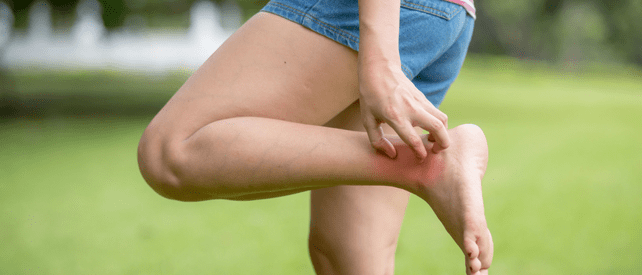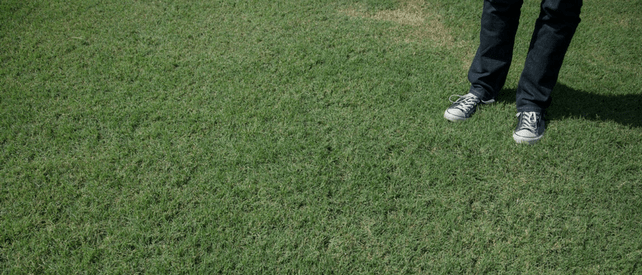How To Stop Fleas From Biting Me And My Dog

What’s one of the most common? Fleas.
Lots of places have flea “seasons.” Times of the year when you really have to really pay attention to fleas. Not here in Austin. With our warm, humid weather, this area was tailor-made for fleas to thrive year-round, so the bad news is that you don’t get a break. If you are unlucky enough to get an infestation, it can last indefinitely.
Worse? The use of chemical flea deterrents has become so widespread that these pests are developing a resistance. Some people have even started referring to these bugs as “super fleas.”
So, what do you do? How can you avoid getting bitten or—worse—overrun with these tiny bloodsuckers?
At Chem-free, we get asked this question a lot. Our pest management professionals have helped countless Austin pet parents to deal with flea infestations in their homes, and we know what it takes to keep them at bay and give you, your family and your dogs the relief you need.
Below, we’ll share a bit of our knowledge, so you and your dog can enjoy the outdoors without turning your home into a haven for fleas. We’ll cover how to alleviate the irritation of flea bites, as well as discussing some of the most useful remedies available to deal with these pesky pests.

How To Stop Flea Bites From Itching And Feeling Uncomfortable
If you’re reading this, there’s a good chance that you’re already dealing with fleas. That means flea bites. Hopefully, it’s just a minor issue and we only have a few bites, but even one is too much for most people.
For most people, flea bites mean itchiness, rashes, swelling and, in some cases, hives. If you can’t resist the urge and scratch, the bites can get infected.
Fleas really prefer our pets to biting our families, because these pests are attracted to dog and cat fur since it provides them with ample space to hide. On some pets, a flea problem can cause flea bite dermatitis, an allergy characterized by intense itching and skin irritation.
Luckily, you have some options to alleviate the effects of a bite. These strategies are a bit different, depending on whether it’s a human or a canine family member.
Making Flea Bites On People Less Irritating
Treating flea bites on people is similar to treating other types of bites. Some of the ways to make yourself less uncomfortable include plants, medication, herbs and other common household items.
Aloe Vera
Applying this plant to an affected area can minimize redness and swelling.
Antihistamine
These tablets should be reserved for cases where you are experiencing intense itchiness.
Aspirin
Don’t swallow this medicine; instead, wet the pill and rub it into your skin over the bite. Doing so will help minimize symptoms.
Baking Soda And Water
Mix these two ingredients together to create a paste, and then apply it to the wound. This mixture can soothe the area and help with itching.
Calamine Lotion
Another item you might have in your medicine cabinet to help with mosquito bites can also provide comfort for areas affected by flea bites and reduce itching.
Ice Packs
The cold will numb the area, which serves to both reduce itchiness and swelling. Frozen vegetables serve the same purpose.
Rubbing Alcohol
This solution will dry the bites out, which can reduce many of the more frustrating symptoms.
Tea Tree Oil
This essential oil, known for its antiseptic properties, also helps to get rid of itching.
Used Tea Bags
Want to stop inflammation? Just like you can put tea bags under your eyes if you have puffy eyes, you can place your used tea bags in the freezer to cool them off and then apply them to your bites.
Vinegar
If you dilute white vinegar with water (one part of each), this combination can help to relieve symptoms.
Wash It
The most simple, yet effective, way to manage irritation because of flea bites is by cleaning the area. Use antiseptic soap and cold water, because warm water can actually increase itching.
Witch Hazel
A lotion made from the leaves and bark of a plant, witch hazel can also make bites itch less.
Helping Your Flea-Bitten Pets Feel Less Miserable
What if it’s your canine companion who is miserable? There are also a variety of ways to reduce inflammation and control that itchy feeling for your pets as well. Below, we address a few.
Aloe Vera Plant
Veterinarians don’t recommend using aloe vera lotions made for humans on your dog, If you have an aloe vera plant, however, taking the gel directly from the plant can work well and applying it to the bite area.
Apple Cider Vinegar
Some dog owners use this item from your kitchen to stop itchiness in flea bites.
Calendula Ointment
This homeopathic cream stops itching by adding moisture to the irritated area.
Creams or gels
Several different types of over-the-counter varieties are specifically designed to soothe dogs.
Ice
For the same reasons ice helps flea-bitten humans, you can use it on your dogs. Make things easier on yourself by foregoing the icepack and just holding cubes on the affected area.
Lavender Oil
This essential oil can stop itching on your furry family member.
Marigold Extract
Herbal infusions that contain marigold are used for a number of applications, including to stop itching associated with skin irritation.
Oatmeal Bath
Although the other treatments we mentioned can help, the first thing you want to try is to bathe your dog in oatmeal. Draw a warm bath. While the water is filling the tub, create a blended oatmeal-water mixture that you can rub onto your pet’s coat. Leave it on for about 15 minutes, and then rinse off.
Of course, while alleviating the symptoms of bites is all well and good, what you really want is to prevent bites from happening in the first place. These next two sections will cover what you can do to keep fleas away.
Home Remedies To Keep Fleas Off Humans
Many of us want to minimize our exposure to chemicals—especially when we become parents. Luckily, there are a few alternatives to try to keep fleas away from the human members of your household:
- Cover up.We know how hot it can get in our area, especially during the summer months. If keeping fleas away is one of your top priorities, however, one of the best ways to keep fleas off is to wear clothing that protects you better: long sleeves, pants with the cuffs tucked into your socks and so on. The less available skin, the less chance you’ll get bitten.
- Try Lemon Tonic. Lemon juice is a known flea repellant. If you dilute the juice with water and put it in a spray bottle, it’s safe to use on yourself, and even your kids.
- Use Essential Oils. Lemongrass. Geranium. Lavender. Pennyroyal. Eucalyptus. Those are just some of the essential oils that have been found to repel fleas. Dab them onto your skin or spray them onto your clothes to take advantage of their flea-resistant properties.
Now that we have the humans in your home covered (perhaps literally?), let’s move on to discuss your pets.

Home Remedies to Keep Fleas Off Dogs
So, how can you prevent your dogs from suffering from flea bite dermatitis? Try one of the following tactics.
Cedar Beds
Fleas don’t like cedar. Want fleas to leave your dog alone while he or she sleeps? Get a cedar bed.
Citrus Juice
Grapefruits, lemons, oranges–fleas aren’t fans of any of these fruits. If you dribble some of the juice from these citrus fruits onto your dog’s fur, they won’t be a fan of your pooch either.
Add Essential Oils To Bath
We already mentioned that essential oils can repel fleas. If you mix a couple of drops of an essential oil or two into the bath before washing your dog, their fur will be coated and will act as a repellent.
Natural Flea Collar
Instead of buying a commercial collar, add drops of essential oils to a bandana or your pet’s collar and tie it around your dog’s neck.
Spray Their Bed
Use your spray bottle of essential oil and spray your dog’s bed with it.
Vinegar Repellent
Fleas don’t like vinegar, so you can add it to your dog’s bath for yet another natural flea repellent. Even better, put vinegar in your pet’s drinking water. Just make sure you don’t put in too much. A small amount will safely repel fleas without harming your dog.
Before we discuss flea-proofing your home, we want to emphasize that not all essential oils are necessarily safe for dogs. Make sure you research before using them and check with your veterinarian if you are unsure about using the one you have on your pooch.
Home Remedies To Keep Fleas Out of Your Home
One of the challenges about a flea problem is that it can be both indoors and outside at the same time. To address fleas inside, you can try the following:
- Add Natural Predators. Ladybugs and nematodes eat fleas, and both can typically be found at garden stores. Add some to your yard and any flea problem you have will be greatly reduced within a few days.
- Clean. This one may seem obvious or like a cheat, but it’s very important to remember. The more frequently (and thoroughly) you vacuum and wash things, the less likely you are to develop a serious flea problem. Just make sure to empty out your vacuum canister or bag to prevent any living fleas from getting back in.
- Deodorize the Air. This is similar to the salting technique. Spread some flea repellants, such as lemon peels, cedar chips or dried lavender on the floor. Then vacuum it up. Doing so will deodorize the air and introduce a scent that fleas don’t like.
- Drowning by Light. Fleas need to hydrate, and they are attracted to light. You can take advantage of these two facts by mixing either baking soda or soap into a bowl of water. Then place it somewhere your dog can’t reach (and therefore won’t try to drink). Fleas will come to hydrate and end up drowning.
- Salt Floors and Furniture. Why? As crazy as it sounds, when you salt the floor and then vacuum it up, any flea eggs will be killed by dehydration.
- Sprinkle Essential Oils on the Floor. This one is pretty simple. Take some essential oils known to repel fleas and sprinkle drops on the floor or spray areas with a spray bottle.
What if these natural remedies don’t work?

Does DEET Repel Fleas? A Hard Look At Chemical Repellants
There are currently 120 different EPA-approved products on the market that use DEET. Around 1/3 of the U.S. population uses DEET each year to repel bugs–usually mosquitoes. Studies have found that DEET repels a wide range of bugs, including fleas. In fact, DEET is known to be the most effective bug repellent out there.
How does it work? Repellents including DEET mask our scent so insects are not attracted to us. No bugs are killed. They just leave us alone.
All good so far, right?
Not so fast. There are many concerns about how safe the chemical is to use. While multiple studies have declared it safe both for the environment and people—even for children—that doesn’t mean there haven’t been any problems.
Since 1957, there have been 14 cases of encephalopathy in kids, and three of them died. Moreover, it is recommended that you take additional precautions if you decide to use repellents with this active ingredient:
- Avoid using a concentration higher than 30% when possible.
- Don’t use a sunscreen that contains DEET. Sunscreen needs to be frequently reapplied, and DEET shouldn’t be used more than once a day.
- Don’t spray repellent on hands or near mouths because you don’t want to ingest it.
- Don’t spray the chemical near eyes because it can irritate them.
Those are a lot of caveats for something that’s totally safe and we all have to weigh the pros and cons very carefully to make a decision that makes sense for our families.
Flea Problems Too Much For You? Chem-free Can Help
As you can see, you have many options available if you are suffering from a flea problem. A true infestation, though, can sometimes be too difficult and time-consuming to deal with on your own. If you’re struggling with fleas in your home and want some relief without putting your family or the environment at risk, look no further than Chem-free. Our highly-skilled technicians can identify the source of your problem and suggest low-impact intervention methods to protect your family and pets from the hassle and discomfort of flea bites. Contact us by phone or online to schedule a service.
Need Help Managing Pests?
Chem-Free offers both effective, low-impact pest control options and preventative measures to help avoid future infestations. Contact us today for a free estimate!



